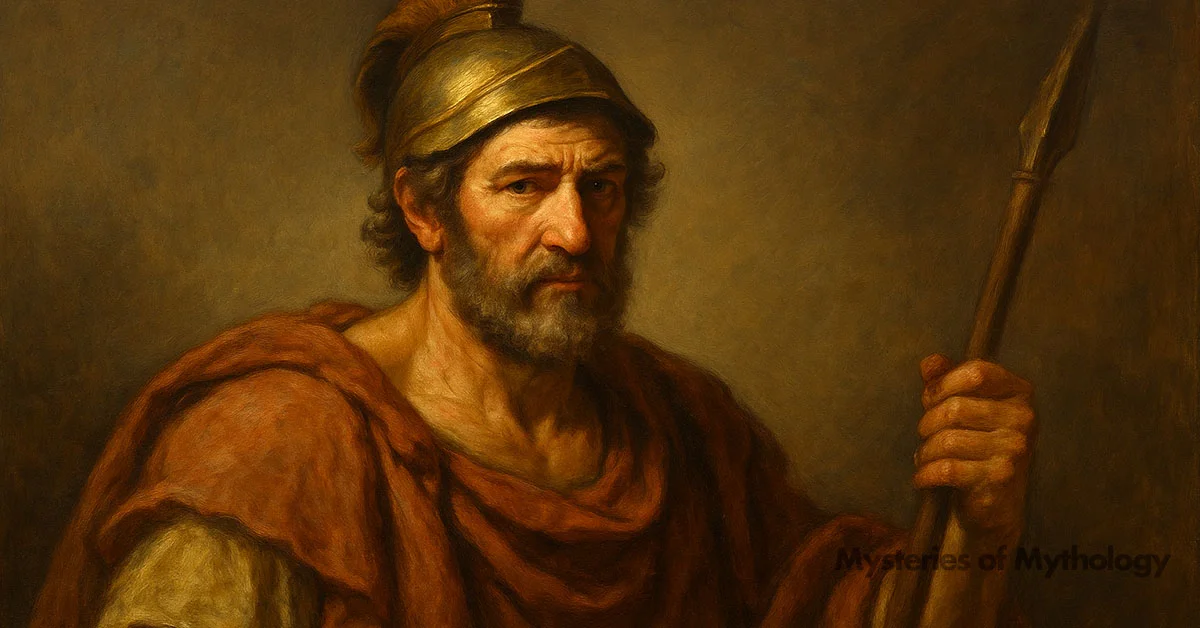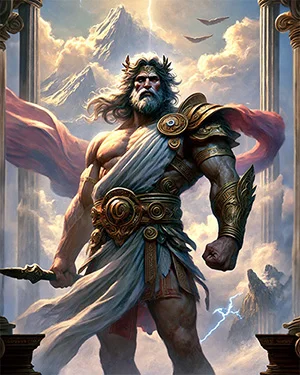Overview
The Odyssey isn’t just a story — it’s the story. A tale of monsters, gods, lies, and very poor decision-making. At its core, it’s the ancient Greek version of “just popping out and getting stuck in traffic for 20 years.” After fighting in the Trojan War, Odysseus, king of Ithaca, begins what should be a short sail home. Instead, he’s shipwrecked, seduced, cursed, nearly eaten, and repeatedly betrayed — all while his kingdom falls apart in his absence.
Told through epic poetry (and at one point possibly memes around 800 BC), The Odyssey isn’t just a follow-up to The Iliad — it’s a survival horror about wit versus war, fate versus freedom, and what it means to truly return home. This post walks through the most famous Greek epic of all time with a fresh voice and modern lens, exploring how a man known for his cunning was often too clever for his own good.
Want to know more? Read on…
Watch the related video
Etymology
The name Odyssey comes from the Greek Ὀδύσσεια (Odýsseia), which directly refers to the tale of Odysseus. In its most literal sense, the word means “the story of Odysseus” — a fitting title for an epic centred entirely around his chaotic journey home.
The root of Odysseus (Greek: Ὀδυσσεύς) is debated, but one common interpretation links it to the Greek word ὀδύσσομαι (odýssomai), meaning “to be angry at” or “to hate.” This etymology makes a surprising amount of sense: nearly every god he meets has a bone to pick with him. And even his friends don’t tend to fare much better.
Pronunciation
Pronunciation
ENGLISH
Odysseus
GREEK
Ὀδυσσεύς (Odysseús)
PHONETIC
[oh-DISS-ee-uhs]
IPA
/oʊˈdɪsiəs/
Alternate Names
Odysseus doesn’t go by many names, but you’ll occasionally come across:
- Ulysses – his Latin name, popularised by Roman adaptations. Still used widely in English, especially in translations and references (e.g. James Joyce’s Ulysses).
- Laertiades – a Homeric title meaning “son of Laertes.”
- The man of many wiles – an epithet highlighting his intelligence and trickery.
In many ancient texts, he’s rarely introduced by name alone. He’s often described with phrases like “the cunning one,” “long-suffering Odysseus,” or “sacker of cities.”
Attributes
Appearance
Unlike many Greek heroes who were described as towering and godlike, Odysseus was rarely portrayed as physically imposing. Ancient texts don’t dwell on his looks — what mattered was his mind. That said, Homer does refer to him as broad-shouldered and dark-haired, with an authoritative presence and a strong, confident voice.
When disguised by the gods (or necessity), he could take on many forms — from a dishevelled beggar to a radiant war leader. It’s not his beauty that defines him, but his ability to adapt.
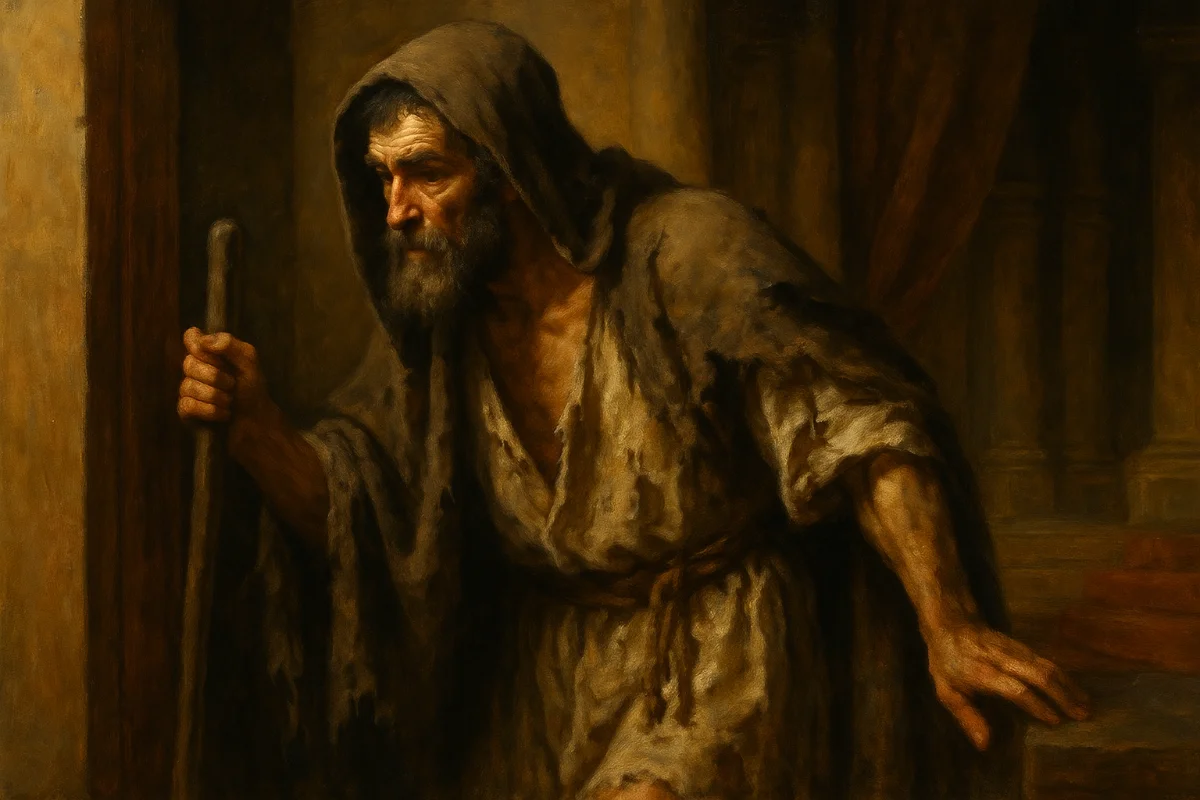
Origination
Odysseus was the son of Laertes, a king of Ithaca, and Anticleia, a noblewoman. His homeland, Ithaca, was a rocky island in the Ionian Sea — not the wealthiest of kingdoms, but strategically important.
Before the Trojan War, he was known more for his cleverness than his strength. When summoned to war, Odysseus famously tried to dodge the draft by pretending to be mad, ploughing a field with salt. The ruse failed, but it set the tone: Odysseus would always try brains before brawn.
Abilities
Odysseus’ defining attribute was intellect.
- Strategic genius: He devised the Trojan Horse — a move that ended a decade-long war.
- Silver tongue: His persuasive skills could charm kings, goddesses, and angry mobs.
- Survivor’s instinct: Where other heroes died glorious deaths, Odysseus lived — often narrowly — through cunning, lies, and compromise.
- Master of disguise: Thanks to Athena (and his own talents), he could manipulate his appearance and story to suit the situation.
Habitat
Odysseus ruled the island kingdom of Ithaca — a real place in western Greece known for its mountainous terrain and seafaring history. In the epic, it’s portrayed as remote, rocky, and deeply tied to family and honour.
But “home” is a shifting concept in The Odyssey. For most of the story, Odysseus lives everywhere but Ithaca — shipwrecked on islands, trapped in caves, living with witches, or drifting alone on the sea. His journey takes him through:
- Ogygia – Calypso’s idyllic prison
- Aeaea – Circe’s island of transformation
- Scheria – the last stop before home, land of the Phaeacians
- The Underworld
Family
Odysseus may be known for his solo travels and chaotic detours, but his roots — and his reasons — are anchored in family. His entire journey in The Odyssey is about returning to them: a loyal wife, a growing son, and a lineage he hopes to protect.
Son: Telemachus, born just before Odysseus left for Troy — a boy who grows into a man in his father’s absence and ultimately joins him in reclaiming their home.
Father: Laertes, an ageing king who eventually withdraws to a simple life in the countryside.
Mother: Anticleia, who dies from grief while Odysseus is lost at sea.
Wife: Penelope, famously faithful, outwitting over a hundred suitors for twenty years while holding the kingdom together.
Family Tree
Grandparents
Grandfather
Arcesius
Grandmother
Arcesius
Parents
Father
Laertes
Mother
Anticleia
Spouse/Consort
Wife
Penelope
Children
Son
Telemachus
Mythology
Calypso and the Island of Ogygia
When we first meet Odysseus in The Odyssey, he’s not sailing or fighting — he’s stuck. Held on the remote island of Ogygia, Odysseus has spent seven long years as the reluctant guest (or prisoner) of the nymph Calypso.
She offers him everything: comfort, luxury, immortality — and herself. But Odysseus sits on the shore every day, crying and staring toward the sea. For all her gifts, he longs for home.
Eventually, Athena, who’s had enough of watching her favourite mortal waste away, convinces Zeus to intervene. Zeus sends Hermes to tell Calypso to let him go. Furious, she obeys — and even helps Odysseus build a raft.
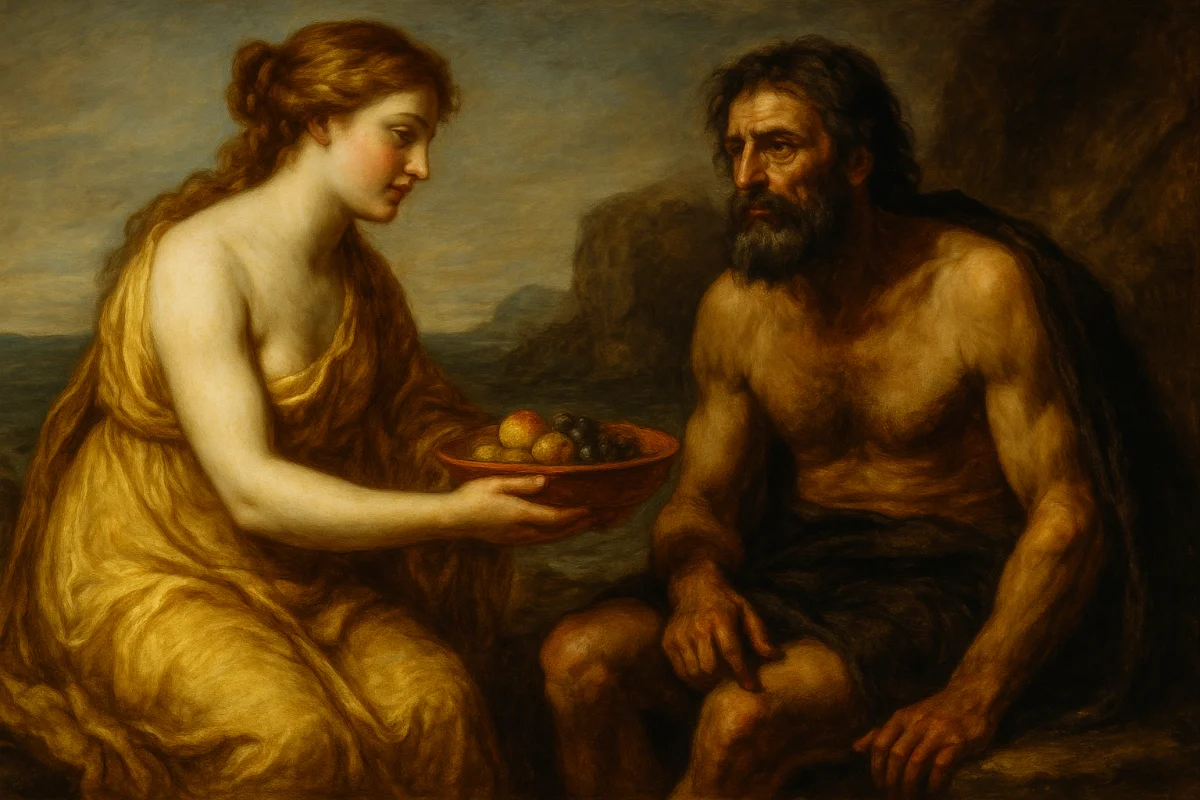
Shipwreck and Scheria
Odysseus sets out across the sea… and it immediately goes horribly wrong. Poseidon, still angry about a certain eye-stabbing incident (we’ll get there), spots Odysseus and sends a storm to smash his raft to splinters.
Floating alone, Odysseus is saved by Ino, a sea goddess who gives him a magical veil to stay afloat. He swims for two days and eventually washes up, naked and exhausted, on the shores of Scheria, land of the Phaeacians.
There, Princess Nausicaa, guided by Athena, finds him while doing laundry (divine dream logic). She offers help, food, and a chance at rescue — if he plays it smart. Which, for once, he does.
Flashback: Life Falls Apart in Ithaca
While Odysseus fights for his life at sea, things in Ithaca are not going well.
After twenty years with no word, the people assume Odysseus is dead. Over a hundred suitors move into his palace, eating his food, drinking his wine, and pressuring his wife Penelope to remarry.
Penelope delays them with a clever ruse: she claims she’ll choose a new husband once she finishes weaving a funeral shroud — but secretly unpicks her work each night.
Meanwhile, Telemachus, now grown, is full of silent rage but doesn’t know what to do. That is, until Athena (disguised as a family friend named Mentor) urges him to search for his father and reclaim his future.
Telemachus Sets Sail
Inspired by Athena’s encouragement, Telemachus leaves Ithaca under cover of night to search for news of his father. He travels first to Pylos, where King Nestor offers wisdom but no solid leads — only tales of the Greek kings’ chaotic returns from Troy.
From there, Telemachus journeys to Sparta, where Menelaus and Helen (yes, that Helen) recognise him instantly as Odysseus’ son. Menelaus shares that he once heard from a shape-shifting sea god that Odysseus is alive, trapped on an island with a goddess.
Telemachus finally has hope. But back home, the suitors have realised he’s missing — and they’re sharpening their knives.
The Lotus-Eaters
As Odysseus recounts his story to the Phaeacians, we flash back to the beginning of his voyage home.
After leaving Troy, Odysseus and his men land among the Lotus-Eaters — a peaceful people who offer them the sweet fruit of the lotus plant. It seems harmless… but those who eat it forget everything: the war, their homes, even their own names.
Odysseus recognises the danger. He drags his dazed men back to the ship, ties them down if he must, and orders them to row away. This won’t be the last time his men nearly doom them all through a bad decision.
The Cyclops: Polyphemus
Next, Odysseus and his crew land on the island of the Cyclopes. There, they find a cave filled with food, animals, and milk. Against better judgment, they stay — and are soon trapped by Polyphemus, a one-eyed giant and son of Poseidon.
Polyphemus kills and eats several men before Odysseus tricks him by giving him strong wine and claiming his name is “Nobody.” Once drunk, the Cyclops passes out — and Odysseus and his men drive a burning stake into his single eye.
When other Cyclopes ask who’s hurting him, Polyphemus screams, “Nobody is hurting me!” and gets no help.
The men escape by clinging to the bellies of sheep as they’re let out to graze. Safe on the ship, Odysseus makes the fatal mistake of bragging and revealing his name. Polyphemus calls on Poseidon for vengeance — and the real trouble begins.
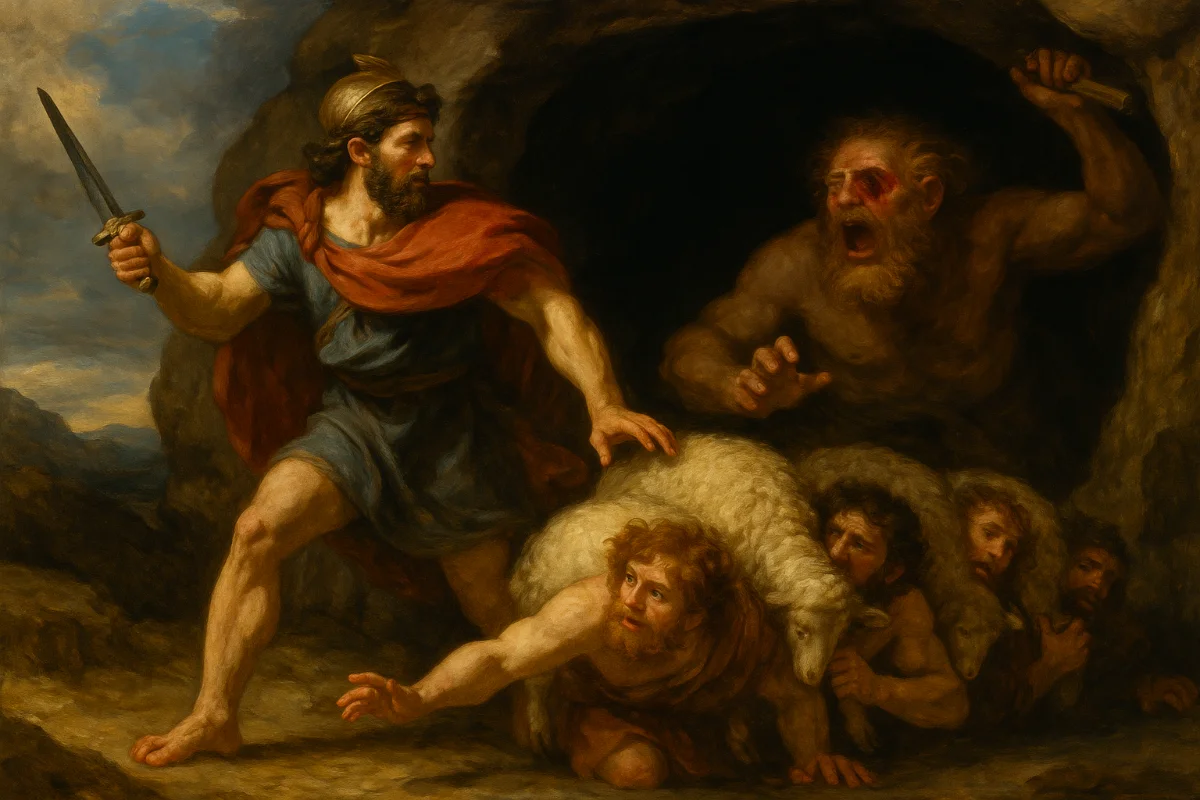
Aeolus and the Bag of Winds
Odysseus sails to the floating island of Aeolia, home of Aeolus, god of the winds. Aeolus, impressed by Odysseus’ story, offers him a gift: a leather bag containing every unruly wind — essentially a god-powered GPS system set to “home.”
With the winds secured, Ithaca comes into sight. But while Odysseus naps, his crew, assuming the bag holds treasure he’s hoarding, opens it.
The winds roar free, blasting the ship back to Aeolia. This time, Aeolus refuses to help. If the gods hate you, he says, I want no part in it.
The Laestrygonians: Cannibal Giants
Still lost at sea, Odysseus lands on what appears to be a peaceful harbour. He sends scouts ahead, who are welcomed by a girl at a well — the daughter of the local king.
But it’s a trap.
The king, Antiphates, is a Laestrygonian, a giant who promptly eats one of the scouts. The rest of the crew barely escapes as the cliffs above erupt with monstrous attackers hurling boulders.
The Laestrygonians destroy eleven of Odysseus’ twelve ships. Only Odysseus’ own ship, anchored outside the harbour, survives.
Once again, disaster — and poor decision-making — has thinned the crew.
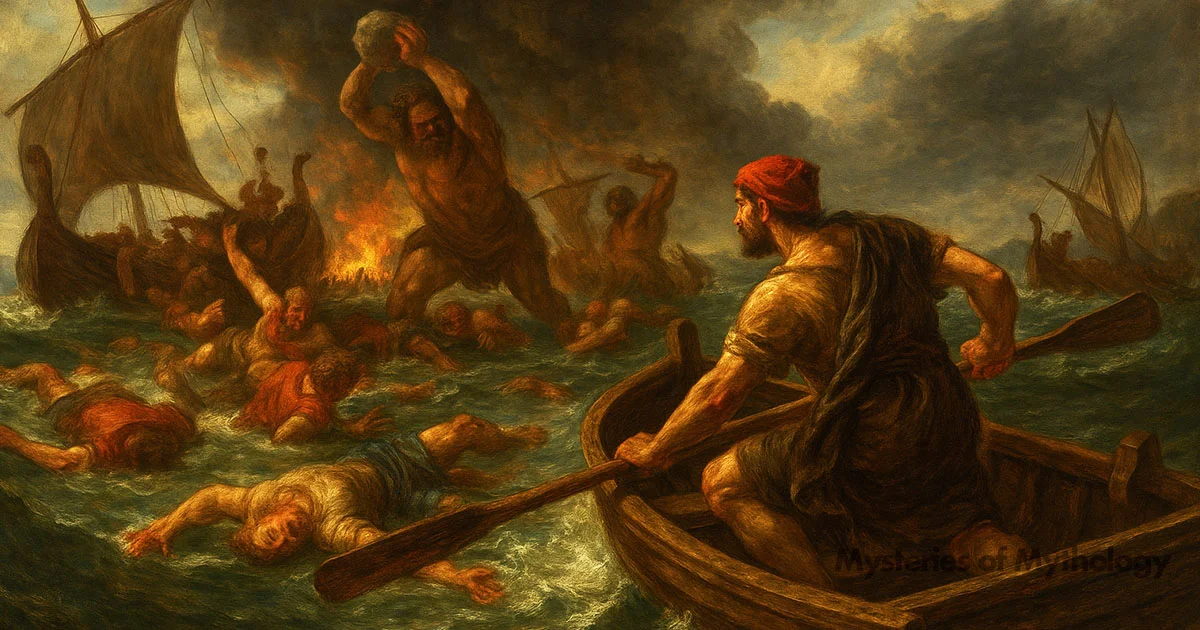
Circe: The Witch of Aeaea
On the island of Aeaea, Odysseus’ scouts find a house in the forest, where a beautiful woman named Circe offers them food and wine. As soon as they’re full, she turns them into pigs.
Only one scout, Eurylochus, escapes and warns Odysseus. On the way to confront her, Hermes appears and gives Odysseus moly — a magical herb that shields him from Circe’s spells.
Odysseus resists her magic, demands the release of his men, and earns Circe’s admiration. She restores his crew and offers hospitality. They stay for a full year, eating, drinking, and forgetting Ithaca.
Eventually, Odysseus remembers he has a home to return to. Circe agrees to help — but tells him he must first journey to the Underworld and seek the prophet Tiresias.
The Underworld: A Ghost-Filled Prophecy
Following Circe’s instructions, Odysseus sails to the edge of the world — to the land of the dead. At the river Acheron, he offers blood, honey, milk, and wine to summon the shades. The ghosts rise, hungry for the living.
Among them is the blind prophet Tiresias, who warns Odysseus: do not harm the sacred cattle of Helios, the sun god. If he does, doom awaits his crew.
Odysseus also sees the spirit of his mother, Anticleia, who died of grief during his absence, and the shades of old comrades like Agamemnon, Achilles, and Ajax.
This isn’t just an errand. It’s a reminder: the dead are many, glory fades, and even heroes end up dust.
The Sirens
Back from the underworld, Odysseus returns to Circe. She prepares him for the next deadly challenge — the Sirens, whose song lures sailors to their deaths.
To survive, Odysseus plugs his crew’s ears with wax. But curious as ever, he orders himself tied to the mast so he can hear the song without steering the ship into ruin.
As they pass, the Sirens sing promises of knowledge, glory, and peace. Odysseus begs to be released. His crew — deaf to his pleas — rows on until the voices fade.

Scylla and Charybdis: Choose Your Nightmare
Next comes the narrow strait between Scylla, a six-headed monster who snatches sailors from the deck, and Charybdis, a whirlpool that devours entire ships.
Circe had warned there’s no safe route — only a less deadly one.
Odysseus chooses to sail closer to Scylla, sacrificing a few men rather than losing the whole ship. He doesn’t tell the crew in advance. Some things, he believes, are better faced without fear.
Six men are taken, screaming. The rest row past, haunted by what they’ve seen.
The Cattle of the Sun: One Rule, Broken
After surviving Scylla and Charybdis, Odysseus and his crew land on the island of Thrinacia, sacred to Helios, the sun god. Both Circe and Tiresias had warned him: do not touch the cattle. But then the storms come.
They’re stranded for weeks. Food runs out. While Odysseus sleeps, the men — starving and desperate — kill and cook the forbidden cows.
It’s a turning point. Even the gods who’ve tolerated their bad behaviour have limits.
Zeus Strikes: One Man Left
Once they leave the island, Zeus makes his move.
He unleashes a storm that obliterates the ship. Lightning strikes the mast, the hull splinters, and the crew is flung into the sea. One by one, they drown.
Only Odysseus survives, clinging to debris as the wreck is dragged toward Charybdis once more. He narrowly avoids being swallowed, drifting aimlessly for days.
No crew. No ship. No direction.
Back to the Beginning: Calypso Again
Eventually, the currents wash him ashore on Ogygia, where the nymph Calypso finds him. She offers comfort, immortality — even love.
But Odysseus never truly accepts. For seven years, he lives in luxury and longing, staring toward the sea, wishing only to return to Ithaca.
Return to Ithaca: The King in Disguise
After hearing his story, the Phaeacians keep their promise. They load Odysseus with treasures, place him on a ship, and sail him home while he sleeps.
He wakes on the shores of Ithaca — finally. But he doesn’t rush home. He’s learned caution. Athena appears and transforms him into an old beggar, allowing him to move unnoticed.
He reunites with Eumaeus, a loyal swineherd, and later, Telemachus, who has just returned from Sparta. With Athena’s help, father and son form a plan.
The Contest of the Bow
Penelope, still resisting the suitors, devises a test: she will marry the man who can string Odysseus’ great bow and shoot an arrow through twelve axe heads.
One by one, the suitors fail.
Then the beggar asks to try.
Amid jeers, he picks up the bow, strings it easily, and completes the shot. Silence falls.
Odysseus sheds his disguise. The time for games is over.
Revenge in the Hall
With Telemachus at his side, Odysseus turns the bow on the suitors. He kills Antinous first — the ringleader. Chaos erupts.
They lock the doors. No one escapes.
It’s a massacre. The loyal servants — Eumaeus, Philoetius, and the nurse Eurycleia — help identify the traitors among the staff. The disloyal are punished.
Justice, bloody and final, is restored.
The Olive Tree Bed: Final Proof
When the killing ends, Penelope is told her husband has returned. But after twenty years of grief and lies, she doesn’t believe it.
She tests him: “Move our bed outside the chamber,” she says.
Odysseus freezes. The bed can’t be moved — he built it around a living olive tree. Only the real Odysseus would know that.
Penelope breaks. The reunion is quiet, tearful, and real.
The journey is over.
Pop Culture
Odysseus — or Ulysses, as the Romans renamed him — remains one of the most enduring characters in Western storytelling. His story has been retold, reimagined, and referenced for over two millennia:
Literature:
Ulysses by James Joyce is a modernist retelling set in 20th-century Dublin.
O Brother, Where Art Thou? (2000), directed by the Coen Brothers, is a Depression-era reworking of The Odyssey.
Margaret Atwood’s The Penelopiad retells the myth from Penelope’s point of view.
Television and Film:
Odysseus appears in Troy (2004), played by Sean Bean, blending his Iliad and Odyssey roles.
Numerous animated series, from Ulysses 31 to Class of the Titans, adapt his adventures.
Games:
Assassin’s Creed: Odyssey heavily draws from the epic, with choices and journeys reflecting Odyssean themes.
Hades by Supergiant Games references him indirectly through stories and character dialogue.
Psychology:
The term “Odyssean journey” has entered academic and therapeutic language to describe long personal journeys of transformation.
Frequently Asked Questions
What is the main message of The Odyssey?
At its core, The Odyssey explores themes of perseverance, loyalty, and the human struggle against adversity. Odysseus’ journey home symbolises the challenges one faces in life and the importance of determination and resilience in overcoming them.
How does Odysseus escape from the Cyclops?
Odysseus devises a cunning plan to escape the Cyclops, Polyphemus. He introduces himself as “Nobody,” gets Polyphemus drunk, and then blinds him with a heated stake. When Polyphemus calls for help, he says “Nobody” is hurting him, leading the other Cyclopes to ignore his pleas. Odysseus and his men then escape by clinging to the undersides of sheep as they exit the cave.
Who are the suitors in The Odyssey, and what happens to them?
The suitors are a group of 108 men who overrun Odysseus’ home, vying for Penelope’s hand in marriage during his prolonged absence. They consume his wealth and disrespect his household. Upon his return, Odysseus, with the help of Telemachus and loyal servants, kills all the suitors to reclaim his home and honour.
What role does Athena play in The Odyssey?
Athena, the goddess of wisdom and war, acts as Odysseus’ divine protector. She assists him in various ways, such as advocating for his release from Calypso, disguising him upon his return to Ithaca, and providing guidance throughout his journey.
Why is The Odyssey considered an epic poem?
The Odyssey is classified as an epic poem due to its grand scale, heroic protagonist, and the involvement of supernatural elements. It encompasses a long, adventurous journey, explores profound themes, and reflects the values and beliefs of ancient Greek society.
References
- Homer. The Odyssey. Translated by Robert Fagles. Penguin Classics, 1996.
- Homer. The Odyssey. Translated by Emily Wilson. W.W. Norton & Company, 2018.
- James Joyce. Ulysses. Sylvia Beach, 1922.
- Margaret Atwood. The Penelopiad. Canongate Books, 2005.
- Robert Graves. The Greek Myths. Penguin Books, 1955.
- Edith Hamilton. Mythology: Timeless Tales of Gods and Heroes. Little, Brown and Company, 1942.
- SparkNotes Editors. “The Odyssey.” SparkNotes LLC.

